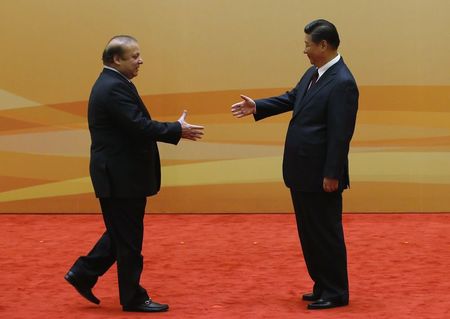By Mehreen Zahra-Malik
ISLAMABAD (Reuters) - The Chinese government and banks will finance Chinese companies to build $45.6 billion(29.1 billion pounds)worth of energy and infrastructure projects in Pakistan over the next six years, according to new details of the deal seen by Reuters on Friday. The Chinese companies will be able to operate the projects as profit-making entities, according to the deal signed by Prime Minister Nawaz Sharif during a visit to China earlier this month.
At the time, officials provided few details of the projects or the financing for the deal, dubbed the China-Pak Economic Corridor (CPEC).
The deal further cements ties between Pakistan and China at a time when Pakistan is nervous about waning U.S. support as troops pull out of Afghanistan.
Pakistan and China, both nuclear-armed nations, consider each other close friends. Their ties are underpinned by common wariness of India and a desire to hedge against U.S. influence in South Asia.
Documents seen by Reuters show that China has promised to invest around $33.8 billion in various energy projects and $11.8 billion in infrastructure projects.
Two members of Pakistan's planning commission, the focal ministry for the CPEC, and a senior official at the ministry of water and power shared the details of the projects.
The deal says the Chinese government and banks, including China Development Bank[CHDB.UL], and the Industrial and Commercial Bank of China Ltd (ICBC) (SS:601398), one of China's 'Big Four' state-owned commercial banks, will loan funds to Chinese companies, who will invest in the projects as commercial ventures.
"Pakistan will not be taking on any more debt through these projects," said Pakistan's minister for water and power Khawaja Asif.
Major Chinese companies investing in Pakistan's energy sector will include China's Three Gorges Corp[CYTGP.UL], which built the world's biggest hydro power scheme, and China Power International Development Ltd (HK:2380).
Sharif signed more than 20 agreements during his trip to China earlier this month, including $622 million for projects related to the deepwater, strategically important Gwadar port, which China is developing.
The port is close to the Strait of Hormuz, a key oil shipping lane. It could open up an energy and trade corridor from the Gulf across Pakistan to western China that could be used by the Chinese Navy - potentially upsetting rival India.
Pakistan sees the latest round of Chinese investments as key to its efforts to solve power shortages that have crippled its economy.
Blackouts lasting more than half a day in some areas have sparked violent protests and undermined an economy already beset by high unemployment, widespread poverty, crime and sectarian and insurgent violence.
Under the CPEC agreement, $15.5 billion worth of coal, wind, solar and hydro energy projects will come online by 2017 and add 10,400 megawatts of energy to the national grid, officials said.
An additional 6,120 megawatts will be added to the national grid at a cost of $18.2 billion by 2021.
"In total we will add 16,000 MW of electricity through coal, wind, solar and hydel plants in the next seven years and reduce power shortage by 4,000 to 7,000 megawatts," said Asif.
"This will take care of a growing demand for power by a growing economy."

The CPEC deal also includes $5.9 billion for road projects and $3.7 billion for railway projects, all to be developed by 2017. A $44 million optical fibre cable between China and Pakistan is due to be built.
(Reporting by Mehreen Zahra-Malik; Editing by Jeremy Laurence)